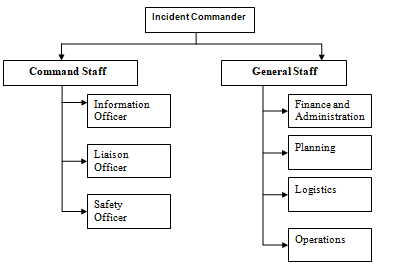Introduction to the Incident Command System (ICS)
Incident Command System (ICS) is a concept applied in management that enables responders to realize an organizational structure that has the capacity of one or even more incidents. This structure is not bound by the boundaries of jurisdiction. This concept was brought to being in the early 1970s to address several problems that were being faced together with the wildfires that were spreading very fast.
These problems included; one supervisor being reported to by many people and poor means of communication. Reliable incident information was not only unavailable but, in addition to this, organizational structures were not similar. Agencies lacked a planning structure that was contributed by lack of proper lines of authority.
Furthermore, agencies had differences amongst themselves and their set objectives were ambiguous. The ICS was transformed into a national program by federal officials in 1980. The new program was National Interagency Incident Management System (NIIMS). Agencies with wildfire management sought the NIIMS for a responsive management.
An ICS provides a platform for proper communication and planning in any organization. It controls the organization by splitting an emergent response into five functions that can be easily managed.
They are; Administration, Operations, Logistics, Finance, Command and Planning. ICS is applied in the U.K., as well as Canada (Federal Emergency Management Agency)
Duties and responsibilities of
Incident Commander (IC)
The incident commander is also referred to as the unified command (UC). The IC is involved in the coming up of objectives, as well as managing all functions so as to fulfill the set objectives.
These responsibilities include; proper management of resources, as well as managing the cost effectiveness. They are also involved in ensuring life safety and good health for their responders, bystanders and other workers as well as monitoring incident organizations.
Command Staff
The common staff is usually responsible for such sectors as public affairs, they are also the ones who have their duty to support and ensure health and safety, as well as maintain liaison operations in the structure of a command.
Members of the staff are; Information Officer, Liaisons Officer and the Safety Officer and they ensure that questions and rumors raised by the public are addressed (Ministry of Environment)
Another factor addressed by Porter is the bargaining power of customers. Powerful customers will place a high bargain for better services and this involves extra costs and investment. This could also be a blessing in disguise to sell out the ability and glitter of the company and build positively on the company’s reputation.
Some marketing concepts assert that companies have no option but to satisfy customer needs better than their competitors do. It has been often suggested that companies can either follow what their customers have as their current desires or give them a large surprises with products and service innovations they have not even come close to thinking.
Information Officer
The main responsibility of the information officer is the development of information pertaining an incident and then disseminating it to the news media, other appropriate agencies as well as officials in incident personnel.
Liaison Officer
The liaison officer acts as the linking factor to provide assistance and coordination between the Incident Commander and other agencies and organizations, and hence maintaining a good relation. These personnel may be from the government, criminal agencies, investigators arriving on scene and congresses (Federal Emergency Management Agency.
Safety Officer
Whose responsibility is to come up with proper health and safety measures for the personnel, and then recommend them to the Unified Command. The Officer also looks out for any unsafe situations or factors that would endanger lives and comes up with the Site Safety Plan. The reviewing of the incident Action Plan is done by the officer, who then provides controls for any hazardous situation.
General Staff
The staff includes; Operations, Logistics, Command, Planning, Finance and Administration each of whom has a specific role or responsibility.
Finance and Administration
Whose members are responsible for all activities pertaining financial accounting, cost analysis and administration in the incident.
Logistics
Staff is to ensure that materials, services and facilities are made available, and in good time, to the personnel in connection to the incident response.
Planning
The staff here deals with gathering, evaluating and then releasing data or information concerning the incident. They are also responsible for the preparation and the documentation of the Incident Action Plans (IAPs).
Operations
The staff is responsible for all the functions and activities that are undertaken in connection to the response.
Flowchart illustrating the Incident Command System

Conclusion
The Incident Command System is helpful in that responders apply the part that best fits requirements of their various incidents. Some incidents require all aspects of the ICS, whereas others just need a section of it; for instance the planning, logistics and the finance/ administration.
With its benefits, the ICS should be implemented in agencies (Miller 67). Implementation will ensure that all resources are fully utilized and that proactive steps are followed.
Works Cited
Federal Emergency Management Agency. FEMA GLOSSARY. FEMA, 2011. Web.
Ministry of Environment. Environmental Emergency Management Program- Introduction to Incident Command System.MOE., 2010. Web.